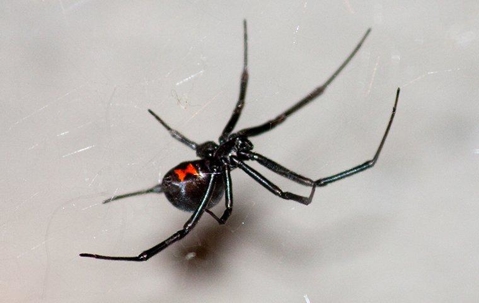Many pests are simple nuisances and don’t pose big threats to our health and safety. Others are much more dangerous to have on or around our property and, while there aren’t many dangerous spiders in the United States, one common threat to American homes is the black widow spider. Knowing how to spot and prevent these creatures from hiding near you and your family may just save you a trip to the emergency room.
How And Where To Spot Black Widow Spiders
Black widow spiders are, as their name suggests, dark-colored arachnids with a telltale red hourglass shape on their bellies. While they are highly venomous, they are timid and non-aggressive creatures that tend to hide from humans. As such, it’s important to know the places to be on the lookout for them:
- Wooded areas: Black widows stick to woody areas, like piles of wood or near the branches of bushes and trees. Examine these places for signs of spiderwebs as an indicator of their activity.
- Dark places: Black widows hunt at night and nest during the day. That means they need dark places that are shielded from the sun to sleep and prepare to prowl. Basements, attics, and the underside of porches or stairwells are common places for black widow spiders to hide.
- Vegetation: Bugs and spiders of all kinds will take advantage of the cover that overgrown grass and vegetation provide.
Black Widow Bites: Rare But Dangerous
While black widows don’t often bite people, since they remain hidden during the day and only bite if threatened, their venom is much more dangerous than a typical household spider’s. Black widow spiders are actually one of the two most dangerous venomous spiders in America, the second being the Brown Recluse. Black widow spider bites not only affect the skin and muscle around the bite but can also affect the neurological and circulatory systems of the body.
The side-effects of a black widow spider bite can vary from case to case, but victims will certainly notice a stinging and itching welt near the site of the puncture. Bite victims can also experience dizziness, nausea, fever, headache, and allergic reactions in those who are most vulnerable to the chemical compound. It’s important to seek medical attention immediately when a bite occurs, since the quick application of anti-venom can reduce or prevent many of the worst symptoms of a bite.
Spider Prevention Tips
Since the risks of contact with a black widow spider can be so great, it’s best to take the steps to prevent them from getting inside your house or near your property in the first place. The following are simple steps you can take to reduce factors that attract spiders inside:
- Wood storage: Black widow spiders especially like woody areas to hide, so large piles of wood right near your home act as a close-proximity nesting ground for spiders. Store firewood and other piles well away from your home or attached structures.
- Moisture control: Not only do spiders themselves look for easy access to water, but humid or moist conditions can also attract other bugs, like mosquitoes, that are ideal prey to snagged on spider webs.
- Pest control: Since spiders hunt other bugs, proper pest control, in general, can reduce the food supply that drives spiders indoors in the first place. Regular inspection and treatment by professionals can provide total pest control.
Be ProActive With Spider Control
While deaths and serious ailments from black widow spider bites are rare and preventable, you definitely do not want to risk exposing your household or business to the threats of a black widow spider infestation. Personal prevention steps can only go so far. Professional pest experts can make sure that your property has been properly inspected for black widow spiders and the things that attract them. For more advice on proper pest control, or to get started on an inspection and treatment, contact Pro Active Pest Control right away.

